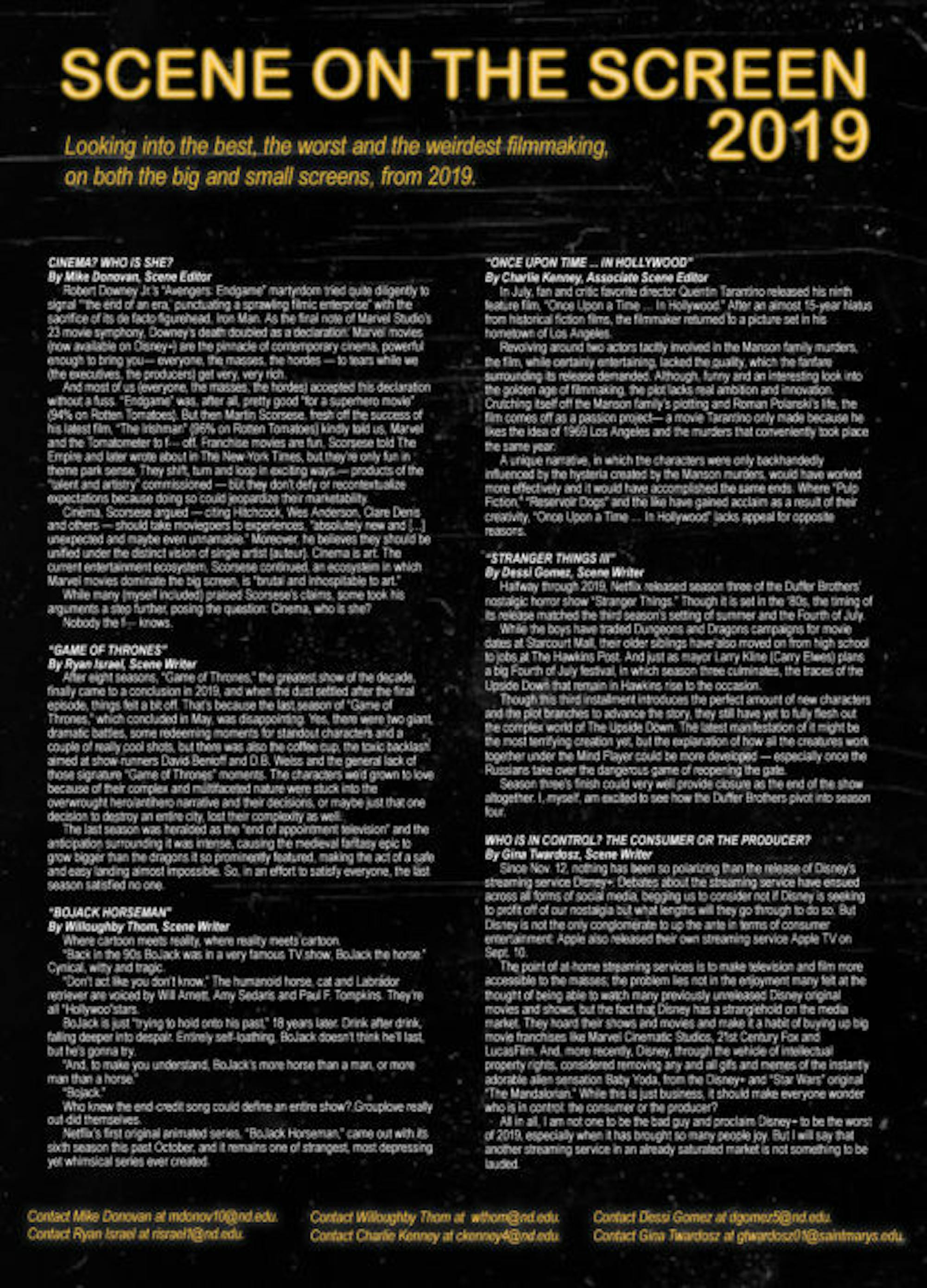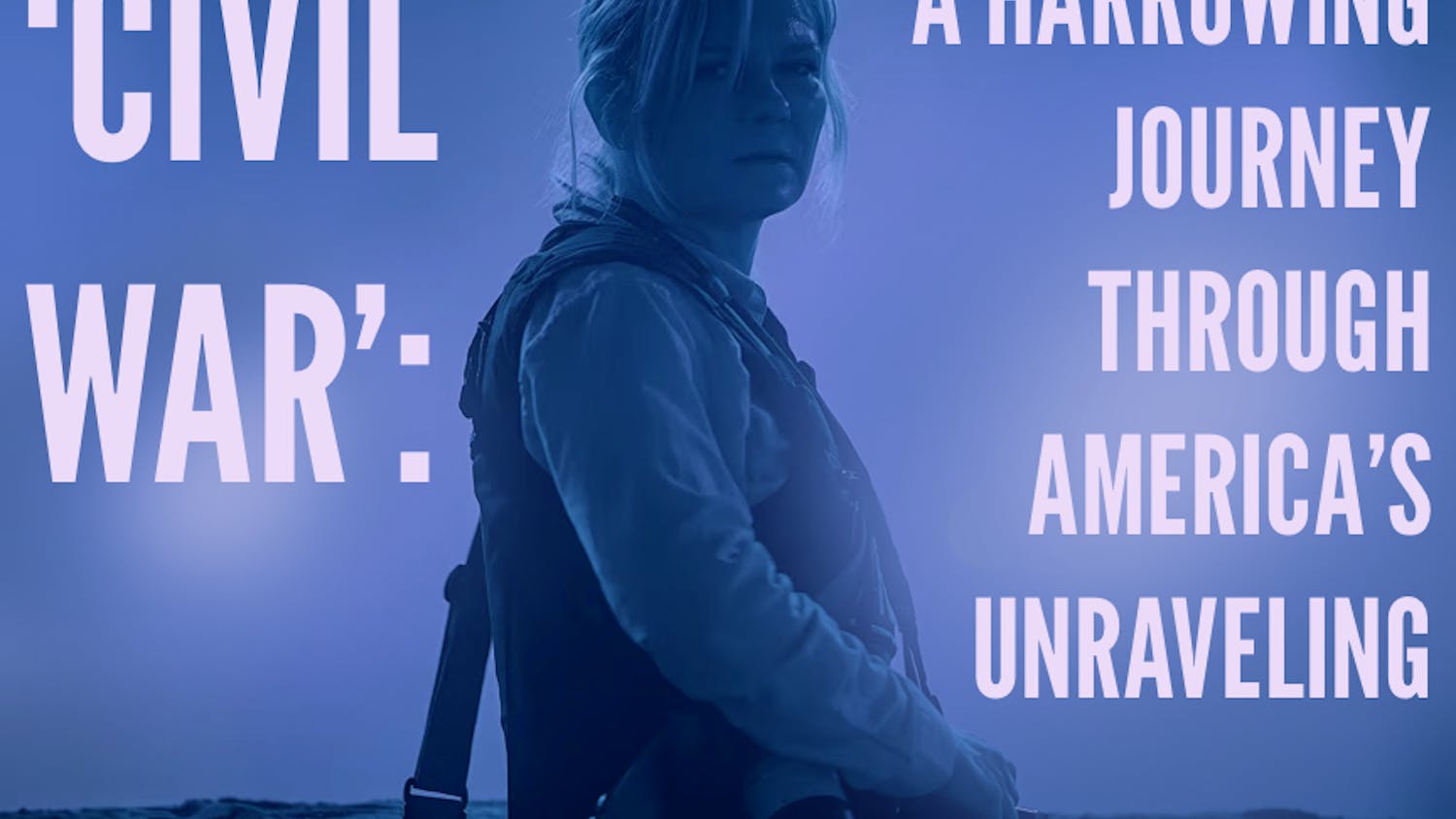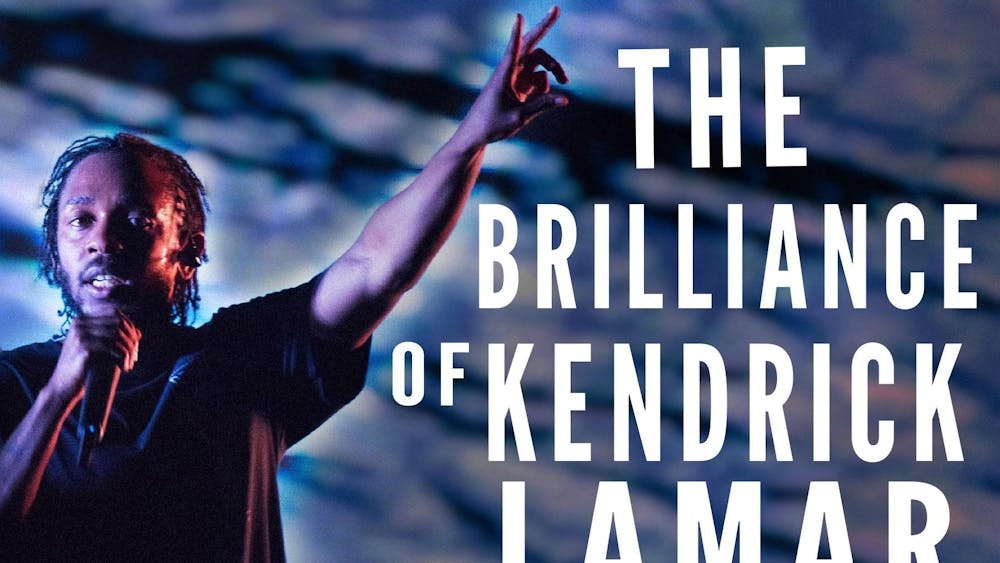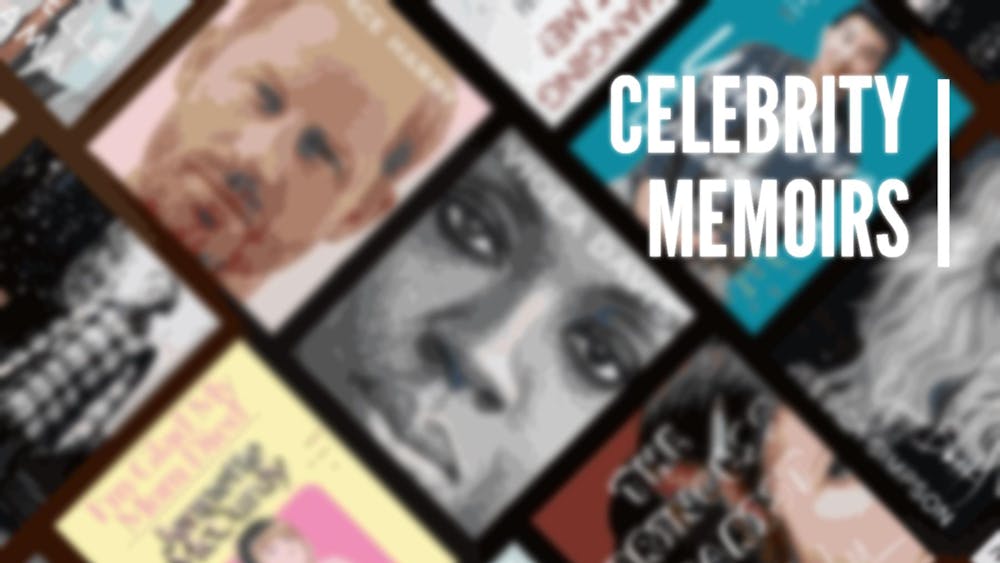
Scene on the Screen: looking into the best, the worst and the weirdest filmmaking, on both the big and small screens, from 2019.
Cinema? Who is she?
By Mike Donovan, Scene Editor
Robert Downey Jr.’s “Avengers: Endgame” martyrdom tried quite diligently to signal “‘the end of an era,’ punctuating a sprawling filmic enterprise” with the sacrifice of its de facto figurehead, Iron Man. As the final note of Marvel Studio’s 23 movie symphony, Downey’s death doubled as a declaration: Marvel movies (now available on Disney+) are the pinnacle of contemporary cinema, powerful enough to bring you— everyone, the masses, the hordes — to tears while we (the executives, the producers) get very, very rich.
And most of us (everyone, the masses, the hordes) accepted this declaration without a fuss. “Endgame” was, after all, pretty good “for a superhero movie” (94% on Rotten Tomatoes). But then Martin Scorsese, fresh off the success of his latest film, “The Irishman” (96% on Rotten Tomatoes) kindly told us, Marvel and the Tomatometer to f--- off. Franchise movies are fun, Scorsese explained to The Empire and later wrote in The New York Times, but they’re only fun in theme park sense. They shift, turn and loop in exciting ways — products of the “talent and artistry” commissioned — but they don’t defy or recontextualize expectations because doing so could jeopardize their marketability.
Cinema, Scorsese argued — citing Hitchcock, Wes Anderson, Clare Denis and others — should take moviegoers to experiences, “absolutely new and […] unexpected and maybe even unnamable.” Moreover, he believes they should be unified under the distinct vision of single artist (auteur). Cinema is art. The current entertainment ecosystem, Scorsese continued, an ecosystem in which Marvel movies dominate the big screen, is “brutal and inhospitable to art.”
While many (myself included) praised Scorsese’s claims, some took his arguments a step further, posing the question: Cinema, who is she?
Nobody the f--- knows.
“Game of Thrones”
By Ryan Israel, Scene Writer
After eight seasons, “Game of Thrones,” the greatest show of the decade, finally came to a conclusion in 2019, and when the dust settled after the final episode, things felt a bit off. That’s because the last season of “Game of Thrones,” which concluded in May, was disappointing. Yes, there were two giant, dramatic battles, some redeeming moments for standout characters and a couple of really cool shots, but there was also the coffee cup, the toxic backlash aimed at show-runners David Benioff and D.B. Weiss and the general lack of those signature “Game of Thrones” moments. The characters we’d grown to love because of their complex and multifaceted nature were stuck into the overwrought hero/antihero narrative and their decisions, or maybe just that one decision to destroy an entire city, lost their complexity as well.
The last season was heralded as the “end of appointment television” and the anticipation surrounding it was intense, causing the medieval fantasy epic to grow bigger than the dragons it so prominently featured, making the act of a safe and easy landing almost impossible. So, in an effort to satisfy everyone, the last season satisfied no one.
“BoJack Horseman”
By Willoughby Thom, Scene Writer
Where cartoon meets reality, where reality meets cartoon.
“Back in the 90s BoJack was in a very famous TV show, BoJack the horse.” Cynical, witty and tragic.
“Don’t act like you don’t know,” The humanoid horse, cat and Labrador retriever are voiced by Will Arnett, Amy Sedaris and Paul F. Tompkins. They’re all “Hollywoo”stars.
BoJack is just “trying to hold onto his past,” 18 years later. Drink after drink, falling deeper into despair. Entirely self-loathing, BoJack doesn’t think he’ll last, but he’s gonna try.
“And, to make you understand, BoJack’s more horse than a man, or more man than a horse.”
“Bojack.”
Who knew the end-credit song could define an entire show? Grouplove really out-did themselves.
Netflix’s first original animated series, “BoJack Horseman,” came out with its sixth season this past October, and it remains one of strangest, most depressing yet whimsical series ever created.
“Once Upon Time ... In Hollywood”
By Charlie Kenney, Associate Scene Editor
In July, fan and critic favorite director Quentin Tarantino released his ninth feature film, “Once Upon a Time … In Hollywood.” After an almost 15-year hiatus from historical fiction films, the filmmaker returned to a picture set in his hometown of Los Angeles.
Revolving around two actors tacitly involved in the Manson family murders, the film, while certainly entertaining, lacked the quality, which the fanfare surrounding its release demanded. Although, funny and an interesting look into the golden age of filmmaking, the plot lacks real ambition and innovation. Crutching itself off the Manson family’s plotting and Roman Polanski’s life, the film comes off as a passion project— a movie Tarantino only made because he likes the idea of 1969 Los Angeles and the murders that conveniently took place the same year.
A unique narrative, in which the characters were only backhandedly influenced by the hysteria created by the Manson murders, would have worked more effectively and it would have accomplished the same ends. Where “Pulp Fiction,” “Reservoir Dogs” and the like have gained acclaim as a result of their creativity, “Once Upon a Time … In Hollywood” lacks appeal for opposite reasons.
“Stranger Things III”
By Dessi Gomez, Scene Writer
Halfway through 2019, Netflix released season three of the Duffer Brothers’ nostalgic horror show “Stranger Things.” Though it is set in the ‘80s, the timing of its release matched the third season’s setting of summer and the Fourth of July.
While the boys have traded Dungeons and Dragons campaigns for movie dates at Starcourt Mall, their older siblings have also moved on from high school to jobs at The Hawkins Post. And just as mayor Larry Kline (Carry Elwes) plans a big Fourth of July festival, in which season three culminates, the traces of the Upside Down that remain in Hawkins rise to the occasion.
Though this third installment introduces the perfect amount of new characters and the plot branches to advance the story, they still have yet to fully flesh out the complex world of The Upside Down. The latest manifestation of it might be the most terrifying creation yet, but the explanation of how all the creatures work together under the Mind Flayer could be more developed — especially once the Russians take over the dangerous game of reopening the gate.
Season three’s finish could very well provide closure as the end of the show altogether. I, myself, am excited to see how the Duffer Brothers pivot into season four.
Who is in Control? The Consumer or the Producer?
By Gina Twardosz, Scene Writer
Since Nov. 12, nothing has been so polarizing than the release of Disney’s streaming service Disney+. Debates about the streaming service have ensued across all forms of social media, begging us to consider not if Disney is seeking to profit off of our nostalgia but what lengths will they go through to do so. But Disney is not the only conglomerate to up the ante in terms of consumer entertainment: Apple also released their own streaming service Apple TV on Sept. 10.
The point of at-home streaming services is to make television and film more accessible to the masses; the problem lies not in the enjoyment many felt at the thought of being able to watch many previously unreleased Disney original movies and shows, but the fact that Disney has a stranglehold on the media market. They hoard their shows and movies and make it a habit of buying up big movie franchises like Marvel Cinematic Studios, 21st Century Fox and LucasFilm. And, more recently, Disney, through the vehicle of intellectual property rights, considered removing any and all gifs and memes of the instantly adorable alien sensation Baby Yoda, from the Disney+ and “Star Wars” original “The Mandalorian.” While this is just business, it should make everyone wonder who is in control: the consumer or the producer?
All in all, I am not one to be the bad guy and proclaim Disney+ to be the worst of 2019, especially when it has brought so many people joy. But I will say that another streaming service in an already saturated market is not something to be lauded.













